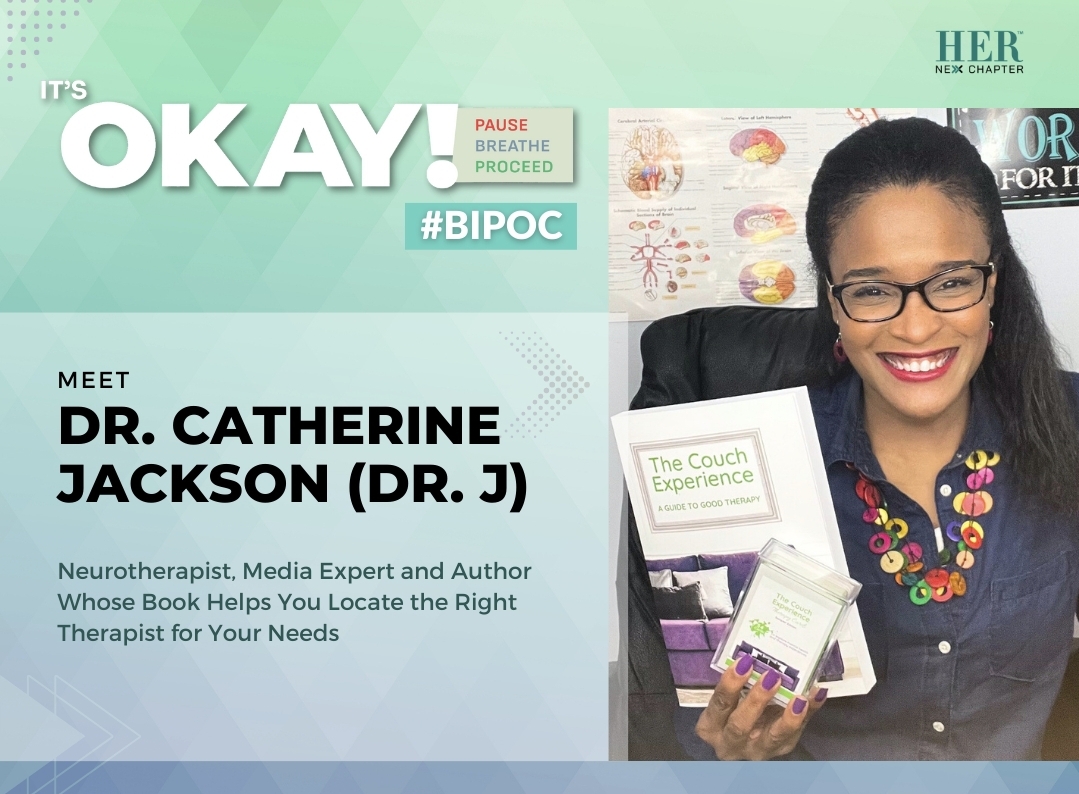Mental health issues, or any health issues, are stressful to handle. A licensed and experienced professional who understands your unique needs makes healing easier. At a time when emotions overwhelm you and you need an expert’s intervention, identifying a therapist should not be a climb up the steep face of a mountain.
Where do you start with your search for a therapist? How do you check if the therapist will understand your needs? Finding the right therapist is an essential step in your healing process. The comfort and trust you have with the therapist is crucial.
I spoke with Dr. Catherine Jackson (Dr. J), a licensed clinical psychologist and a board-certified neurotherapist. She is a speaker in our It’s OKAY! Pause, Breathe, Proceed – BIPOC virtual streaming event, targeting the mental health intricacies of women from Black, Indigenous, and People of Color communities. Streaming on Monday, July 31st at 4 pm PT/ 6 pm CT/ 7 pm ET, learn from Dr. J and other experts who are making a difference in BIPOC mental health issues. Register for this free event here.
Dr. J is also a sought-after international speaker and media expert featured in Forbes, Oprah Magazine, The Huffington Post, CNN, and many other media outlets, and the owner of Optimal Neuroholistic Services (ONS). She is the author of The Couch Experience: A Guide to Good Therapy and the creator of The Couch Experience Therapy Cards. Her book is a thorough guide exploring the process of therapy from beginning to end.
Our conversation started with understanding what a holistic approach to psychotherapy is and its impact. The focus is more on brain-based interventions and addressing the whole person rather than basic talk therapy. Brain mapping and neuropsychological tests enable therapists to identify dysregulated areas of the brain and related symptoms as well as interventions to re-regulate areas with issues.
How do people identify the proper treatment for themselves? Dr. J noted that basic talk therapy is not suited for everyone. They need other treatment options. Some people research and seek holistic opportunities aligned with their values and needs. There are others who, after hitting a wall with traditional talk therapy, try neuropsychological treatments or alternative therapies based on their interests – art, music, or even pet-assisted. Some even approach her for talk therapy, later realizing the need for a holistic approach.
Therapy is individualistic. What works for one person may not work in the same way for another. Some people may be aware of and clearly articulate their issues. There may be cases that need deeper analysis and understanding of an individual’s background, daily routines, and other information. Treatment durations also vary. A typical remediation treatment may need 30 sessions, while neurotherapy treatments can require 40 sessions to see results.
I asked Dr. J to share the best way to identify the right therapist for a person’s mental health issues. She listed the following three steps:
1. Research. Use Google to find therapists in your area. Talk to your friends and family for their recommendations of good therapists.
2. Call. This is important as you can have a 15-minute consultation with each of the therapists you shortlisted. Ask them all of the questions you may have, and gauge the best fit. This step is not just for the therapists to ask you questions about your issue; it is as much an opportunity for you to ask questions.
3. Find someone who has experience with your specific need. Some therapists may not have the experience in the area of mental health that you need support with. It is always good to ask first rather than waste time and money.
Dr. J approaches treatment plans as a combined effort including inputs from her patients. She incorporates various options such as movement and music therapy along with dietary changes that suit the individual. This makes it much more impactful and easier in the long term. Some patients approach her for faith-based therapy that includes scriptures and prayers.
In parting words, Dr. J urges women to not lock into one particular treatment or aspect. It may look one way but work in another unexpected way for you. For people of color, we want to use decolonized treatments, as most treatments were not created by us or for us. Do your research and ask the questions you need to. If your questions perturb the therapist, then they are not the right person for you. You have the right to ask. Be your best advocate.
Her Nexx Chapter’s It’s OKAY! Pause, Breathe, Proceed – BIPOC event aims to increase conversations and encourage people from BIPOC communities to prioritize their mental wellness.
The Future of Connection for Women








0 Comments